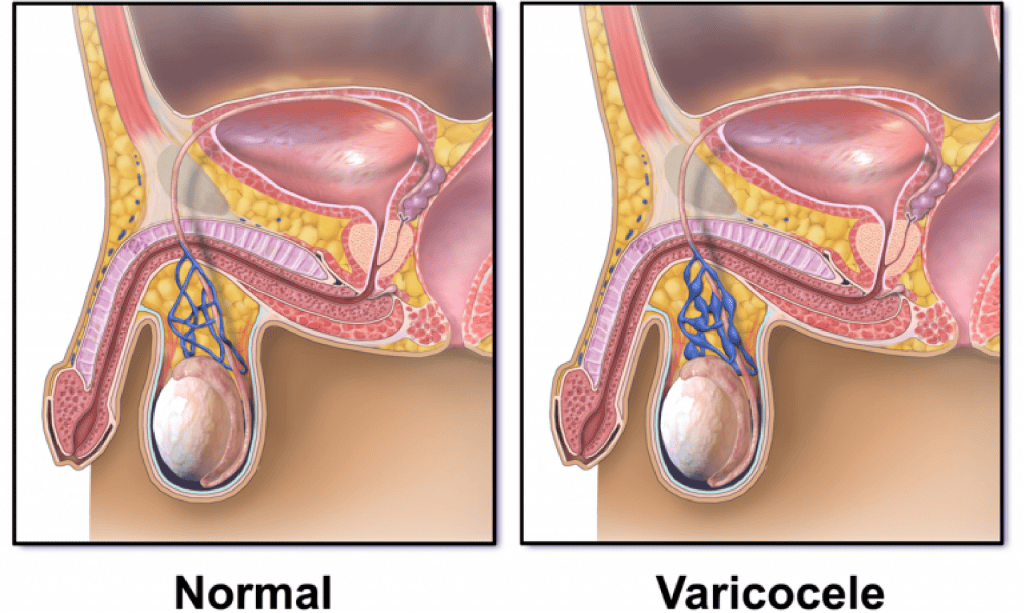
OVERVIEW
Do you sometimes feel mild to moderate, or even severe and long-lasting testicular pain? You could have a varicocele.
A varicocele (VAR-ih-koe-seel) refers to a tangle of dilated veins within the scrotum. The testicles require blood flow from arteries and veins to carry out vital functions. Just like varicose veins in the legs, when the valves in the testicular veins fail, blood flows backwards and pools, becoming stagnant and causing painful congestion and swelling.
Varicocele patients may experience piercing sharp pain to dull throbbing ache in the testicle, scrotum or groin, that stretches to their abdomen area. Sufferers from varicocele also experience scrotal heaviness that worsens with exercise, or after prolonged standing.
Varicoceles are common, affecting 1 in every 5 men [1]. They commonly occur in the left side of the scrotum due to the positioning of the left testicular vein, though in some cases it affects the right side or even both.
Some patients may not experience any pain symptoms. However, varicoceles are major causes of low sperm production and decreased sperm quality, which eventually lead to infertility in 40% of all men who have problems fathering their first child. They could inhibit the regular development of testicles and instead cause them to shrink.

SYMPTOMS
If you happen to have a varicocele, you might experience the following symptoms:
- Varying pain (sharp to dull) in the scrotum and testicles
- Increased pain with standing or physical exertion, especially over long periods of time
- Pain relief upon lying down
- A lump/swelling in one of your testicles
- Visibly engorged or twisted veins in the scrotum (“bag of worms”)
- Testicular atrophy
Some varicoceles do not require any further treatment. However, if you happen to have a varicocele that is very painful, causes swelling in the scrotum, causes testicular atrophy (shrinking of the testicles) or you are considering assisted reproductive techniques, you may want to consider treatment of the varicocele. Varicoceles might keep the temperature of the testicle too high, which affects sperm formation, motility and overall function. The earlier you begin to treat this condition, the better your chances of improving your sperm production and quality.
CAUSES/RISK FACTORS
Varicoceles can happen to men, at any age, and some experts believe that the presence of varicoceles can occur from birth onwards. Varicoceles often form and are detected during puberty, when blood flow to the genitals increases, and in these cases they can prevent proper growth and development of the testicles.
DIAGNOSIS
Fortunately, if you happen to have a varicocele, you need not worry. Most of them are relatively easy to diagnose and many do not need a treatment if they do not show obvious and obstructive symptoms. Varicoceles are usually discovered through a self-examination of the scrotum or during a routine doctor’s examination. They can be identified as a “bag of worms” due to their appearance, and feeling the spermatic cord and testicle size If issues are initially felt during the physical examinations, your doctor might also perform a scrotal ultrasound test, in which ultrasound waves are used to reveal any veins that might be wider than 3 millimeters that could be part of a varicocele.
OUR TREATMENT
A varicocelectomy refers to a same-day surgery that is done in a hospital. There are a couple of ways to perform a varicocelectomy, and all of them involve blocking the blood flow in the veins of the spermatic cord, and will be performed under general anesthesia.
- Microscopic varicocelectomy involves a urologist ligating (clamping or tying) all small veins through a 1cm incision above the scrotum, which takes 2-3 hours to complete. Blood is then able to flow, avoiding these abnormal veins.
- Laparoscopic varicocelectomy involves the urologist inserting thin tubes into the abdomen to ligate the veins, which only takes 30-40 minutes to complete. For both kinds of varicocelectomy, healing time (around 1 week) and pain level are around the same, and the procedures are generally safe, with post-surgical complications being very rare.
Complications although rare, include:
- The varicocele remaining (persisting) or coming back (recurring)
- Fluid forming around the testicle (hydrocele)
- Injury to the testicular artery
Alternatively, a minimally-invasive treatment can be offered, known as percutaneous embolisation, which is carried out through a groin or vein access puncture. In this procedure, a catheter is guided using X-ray fluoroscopy to view the source of the issue and locate all veins leading to the varicocele. During embolisation, metallic coils and embolic agent are injected into the abnormal blood vessels supplying the varicocele in order to block the blood flow. This is done either with local anaesthetic or with light sedation, with the procedure lasting anywhere between 45 minutes to an hour.
After percutaneous embolisation, you will be able to leave the hospital within the day of the surgery, and return to normal daily activities within a week. In addition, the surgery is minimally pain-inducing, effective and safe. The recurrence rate with embolisation is no different from that of surgery, but there are cases whereby embolisation is preferred over surgery. If you are hoping to improve your fertility, treatment for varicocele should definitely be discussed along with other fertility treatment choices.
To find out more, request a consultation with one of our doctors to help you to diagnose varicocele, understand your options and select the best solution available for you.
Click here to download our Varicocele brochure
References
